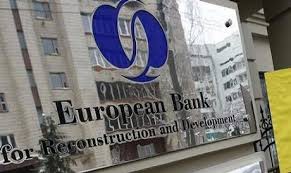


ArmInfo. The European Bank for Reconstruction and Development (EBRD) financed a record volume of projects in Armenia in 2015, providing strong support to the country's economy in a challenging economic environment that was affected by the regional crisis.
The EBRD has told ArmInfo that it financed 14 projects with total investments reaching US$ 140 million for the year, unprecedented level in the 24 years that the Bank has worked in Armenia, and a clear indication of both the investment opportunities in the country and strong demand for EBRD funding.
The investment activities of the EBRD were strongest in the areas of financial institutions, transport, municipal infrastructure, industry, commerce and agribusiness. The EBRD also had another notable year of working with banks to provide trade finance to the Armenian corporate sector. In line with its strategy, the EBRD assisted its clients by increasing the level of local currency financing, helping to further develop capital markets, and supported consolidation of the banking system. In addition, the EBRD participated in a landmark international syndication for Zvartnots International Airport which will provide significant new resources for further investment in Armenia.
In trade finance, Armenia became the an active user of the EBRD's Trade Facilitation Programme, with a total of US$ 48 million in support of local businesses. Focusing on environmentally friendly, commercial provision of public resources, the EBRD signed two municipal projects with the City of Yerevan and the government of Armenia. The Yerevan solid waste project included grant support from the European Union and Yerevan street lighting won the first E5P Fund grant in Armenia.
Commenting on the record level of investments, EBRD Head of the Yerevan Office, Mark Davis, said: "The EBRD's ability to attract increasing financial resources to Armenia is testament to the bankability of our clients and the overall investment climate in Armenia. In a challenging external environment we have consistently focused on allocating resources in ways that are innovative, strategic and add value to investment partners and high quality businesses. The EBRD has consistently proved to be a steady partner."
In 2015, the EBRD also published a new four-year strategy for Armenia that aims to enhance private sector competitiveness; develop capital markets and local currency financing; further develop infrastructure; and commercialise the provision of public services.
"While 2016 is likely to be a challenging year, I see a number of new opportunities in Armenia to add to our client base, and several deal prospects are already maturing. Overall I am optimistic, especially about capital market development and the emergence of more private equity investment activity. Meanwhile, we are delighted with the execution of our deal counterparties, including corporate clients, government authorities, and donors, all of whom have helped make 2015 such a productive year," continued Mr Davis.
To note, the EBRD defined its Strategic Orientations and Strategic Directions for Armenia. Strengthening the competitiveness of the domestic private sector and leveling the playing field is pivotal to Armenia's ability to engender a more broad-based economy, reduce vulnerability to external factors, and achieve sustainable growth. To that end, increased access to finance, particularly for MSMEs, further improvements to the business environment, developing modern management capacity in corporates, and strengthening the value chain are all necessary. Another orientation is developing capital markets and promoting local currency financing. While Armenia currently has access to international capital markets, the development of local capital markets and local currency finance is critical for the country's sustainable development. There is a need for new instruments across firm capital structure, along with modern behavior among corporates in their approach to shareholder value. Capital markets development, especially in the context of pension reform, is another important element that could provide a much needed enhancement to the traditional bank lending that dominates the financial sector, and which has exhausted breathing space for many corporate borrowers. Finally, much more remains to be done to improve and commercialize public services and infrastructure, both for the direct benefit of citizens and to improve the competitiveness of business. In view of the identified sector and country-based transition gaps, the Bank's strategic orientations in the new strategy period therefore concentrate on enhancing private sector competitiveness, developing capital markets, and supporting commercialized public utilities with improved service delivery.
Since the start of its operations in Armenia in 1992, the EBRD has invested over $1.13 billion in 148 projects in the country's financial, corporate, infrastructure and energy sectors, with 88 per cent of these investments being in the private sector.